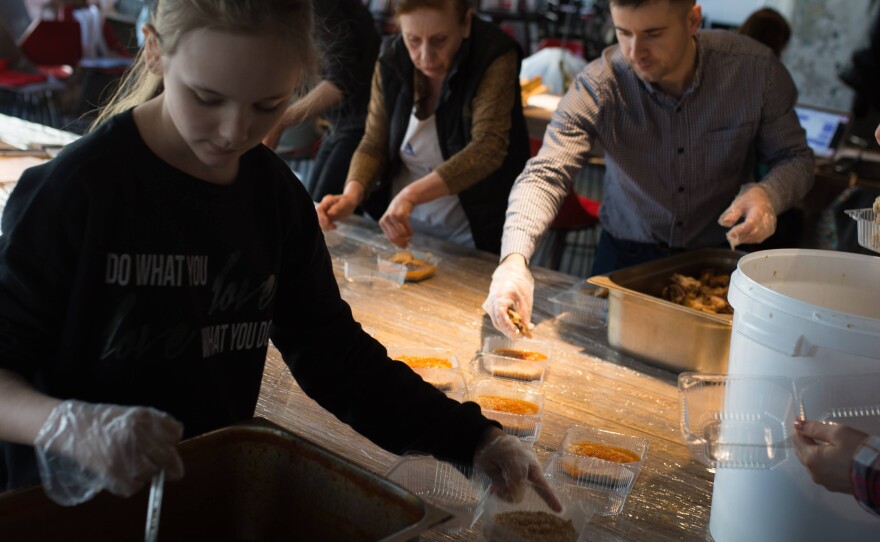DNIPRO, Ukraine — With Russian forces stepping up their fight in eastern Ukraine, residents of the country's largest city near those front lines say they are prepared to win the war at any cost.
Dnipro has stood as an island of relative safety surrounded on three sides by fighting since Russia's invasion began in February.
While the trams still run on time and couples walk the river promenade, the city is transformed by war. Air raid sirens sound near daily. Sandbags are stacked around City Hall. And the sidewalk under the main bridge across the Dnieper is now blocked off with sandbags and barbed wire, with a trio of soldiers standing guard. Dnipro's prewar population of 1 million has swelled by untold numbers as Ukrainians seek shelter here.
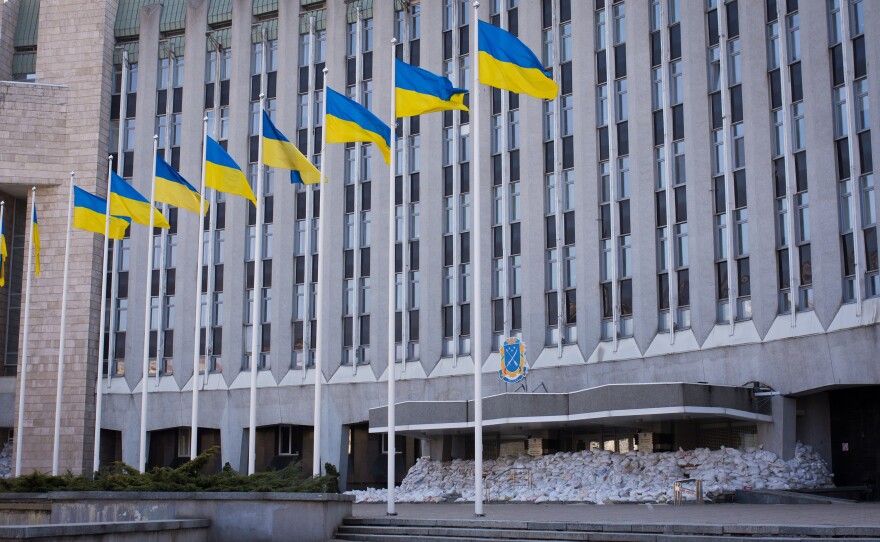
"Everything is used now for shelters for refugees — schools, private offices, people's flats," says Borys Filatov, Dnipro's mayor.
For weeks, Ukraine has warned that Russia could advance on Dnipro from its positions to the south. Now Russia's military says its main goal is to seize the eastern Donbas region.
This city has become a logistical hub for humanitarian aid and a reception point for people fleeing the war in the Donbas and other parts of the country. And locals — at least those who've chosen to stay — are united in saying they believe the city is safe, and that Ukraine will emerge from the conflict victorious.
"I've been living here for my whole life. My parents are buried here. No Russian soldiers will be living here. They will all be killed — thousands, if necessary," Filatov says.

Why Dnipro is key to both sides
The Russian invasion of Ukraine has taken the shape of a backward "C" around Ukraine's border — from Kyiv in the north, curving around its eastern side through Kharkiv and the Donbas, and along the southern coast through Mariupol to Kherson.
Deep in the middle of the C lies Dnipro.
To Russia, the city makes a tantalizing target. Dnipro bridges eastern and western Ukraine with multiple crossings over the Dnieper River. Dnipro was home to the Soviet Union's rocket and missile manufacturing industry — an operation so prized that the city was closed to foreigners until the late 1980s.
The Ukrainian state-owned aerospace companies Pivdenmash and Yuzhnoye, which manufacture and design rockets, still operate in Dnipro. "There is a possibility Russia would try to avoid destruction here because they want to have them," says Ilko Bozhko, a spokesperson for the military recruitment center for the Dnipropetrovsk region, of which Dnipro is the capital.
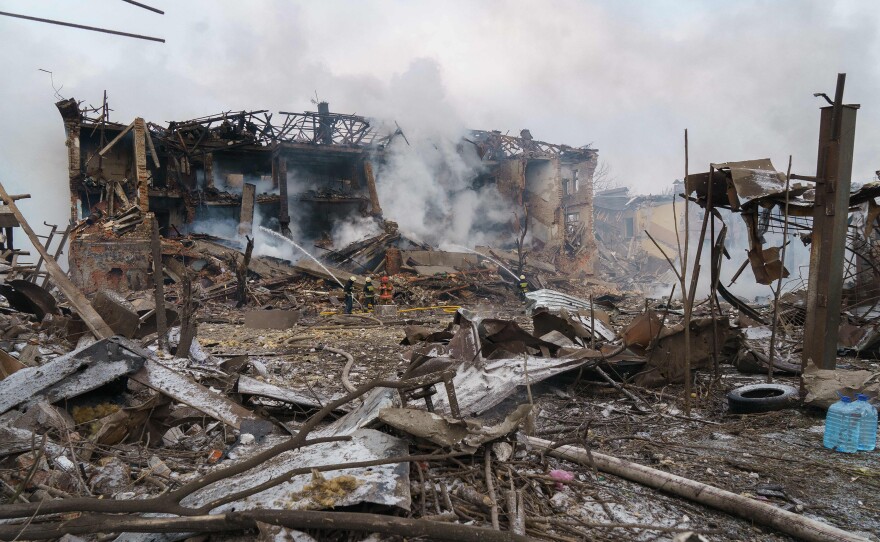
For Ukraine, Dnipro's central location is critical. The city is roughly equidistant from most of the war's major battlegrounds — Donetsk, Mariupol, Kherson and Kharkiv are all within 200 miles — making the city an important logistical hub for supplies and medical care.
Every day, wounded soldiers from the front lines arrive in Dnipro, according to a trauma surgeon at one of the city's hospitals, who asks not to be identified because he is not authorized to speak to the media.
The World Health Organization says Ukrainian health care facilities have been attacked more than 60 times — a risk that could increase for Dnipro's hospitals if the fighting escalates in the east.
"We are preparing right now," the surgeon says. "We keep our evacuation routes clear so we can roll patients in their beds to the shelter. We keep water, we keep food. We check the electricity in the basement. We put sandbags around the generator, around the oxygen station."
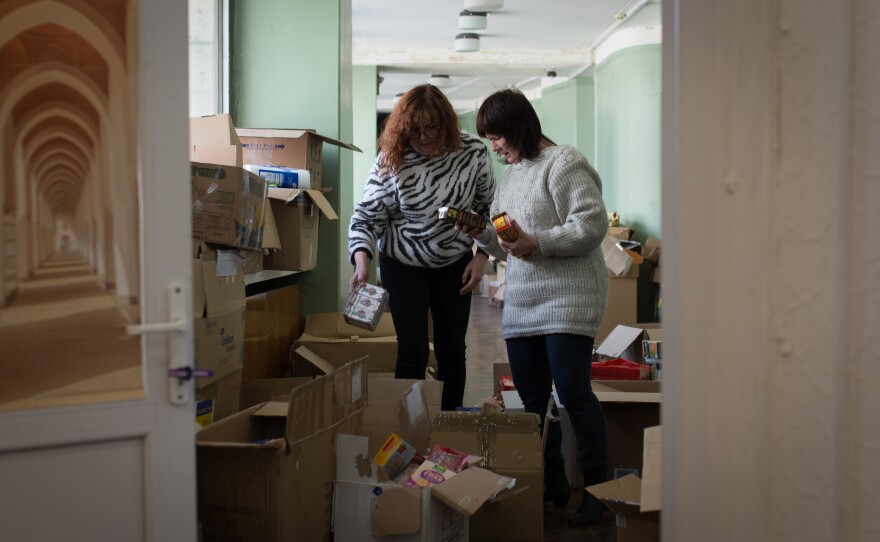
Residents join the war and humanitarian efforts
Civilians, too, have mobilized. More than 20,000 have signed up for the Territorial Defense Force, Bozhko says, a number so large there is a waiting list. Others have opened their homes to displaced people.
Buildings around the city have become volunteer hubs, including a Soviet-era youth center now filled with teenagers packing boxes of supplies for evacuees. And some restaurants are closed to the public, instead turning their kitchens to the task of feeding Territorial Defense volunteers and refugees.
At Moderna, a trendy pizza place downtown, chairs are stacked against the wall and volunteers stand around the communal tables packing meals — porridge with chicken wings, vegetable soup and fresh bread — to be delivered to the local Territorial Defense Forces.
Restaurant owner Ruslan Buryak says he has his own part to play in the war effort. "We're not Mariupol or Kharkiv. From time to time, the rockets explode, but we are ready for anything," he says.
Each day, Buryak and the volunteers — many of them displaced Ukrainians themselves — pack more than 1,000 hot meals. His landlord has forgiven the rent, Buryak explains, and taxes and utility payments are currently optional for small businesses.
"We must do our work here. We must help our army and our country to win," says Anastasiia Yerak, the owner of another restaurant helping to serve meals. "For Ukraine, we don't have another way: We must win."
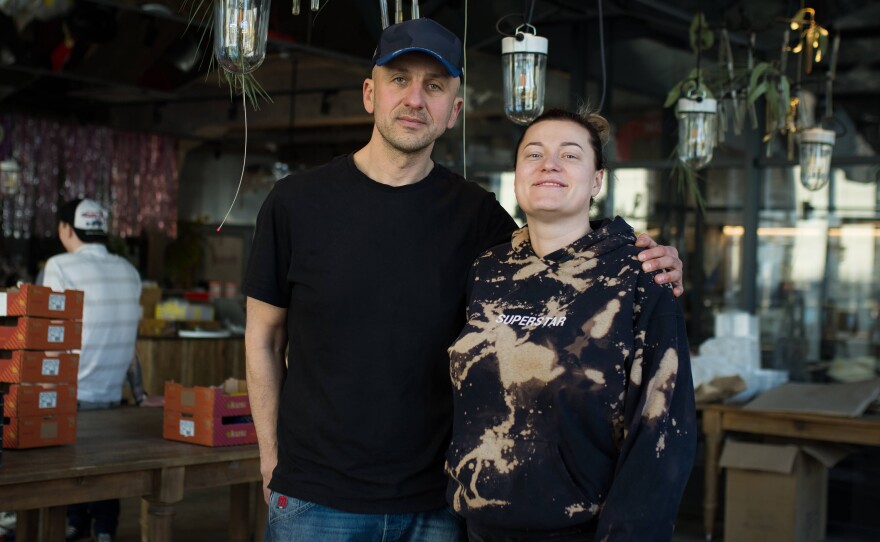
It is a hub for evacuees fleeing war
Dnipro's proximity to the hardest-hit areas has made it a key stop for evacuees. It is hard to say exactly how many have come through the city, according to the mayor, but the most conservative estimates put it at hundreds of thousands.
Some have chosen to stay here, waiting the days until they can return home. Valentina Tretyak, a 71-year-old retired lawyer, came here from Berdyansk, a city on the coast currently occupied by Russians. "I'm not afraid of anything," she says. "I've lived my life and enjoyed it. I believe that with me or without me, the Ukrainians will win."
Many more stay in Dnipro for only a night or three before moving farther west. That was the plan of newlyweds Irina Rumyanceva and Pavel Rubanov, both 53, who arrived here Friday.
They married in their hometown of Mariupol on Feb. 22, they said. Two days later, the invasion began.
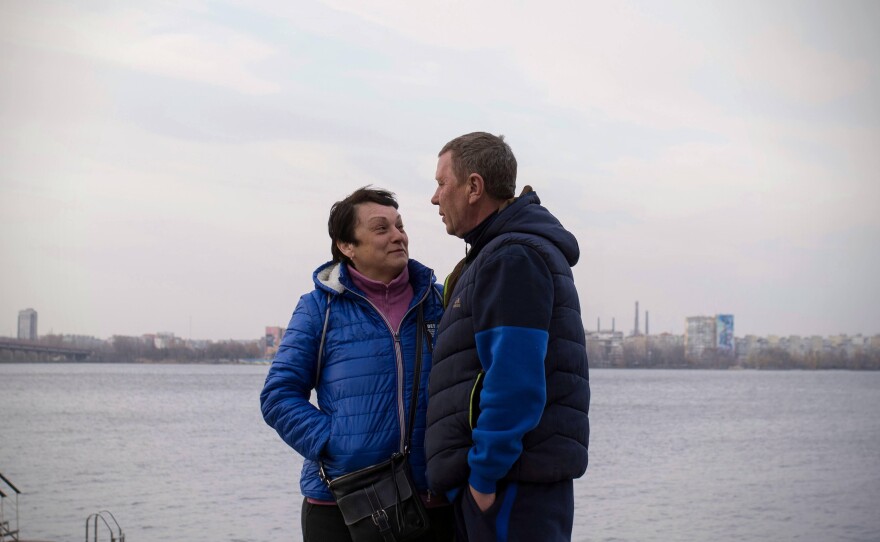
Together, Rumyanceva and Rubanov sheltered for weeks in their basement, hiding from Russia's relentless shelling. The pair described the same disastrous living conditions so many Mariupol evacuees have reported: no electricity, no water, no heat; counting the days until they ran out of food; forced to leave behind friends and family as they desperately fled to safety.
"The city is completely ruined," Rumyanceva says, as she wipes away tears. "There is no place to go back to. All the houses are destroyed."
Dnipro has received so many evacuees that places to stay are in short supply. Rumyanceva and Rubanov say they spent their first night on the floor of a restaurant.
Like most of those seeking refuge in Dnipro, they didn't plan to stay. "We're afraid that everything that's happening in the eastern part of Ukraine is soon going to be the same in Dnipro," Rubanov says.
They've not yet decided where to go next. But for now, Dnipro works: The front lines are 60 miles away, and they can buy a fresh pirozhok pastry any time they like.
Rubanov cracks a joke: "It's kind of like a honeymoon."
Hanna Palamarenko contributed reporting in Dnipro.
Copyright 2023 NPR. To see more, visit https://www.npr.org. 9(MDAzMjM2NDYzMDEyMzc1Njk5NjAxNzY3OQ001))
Loading...


